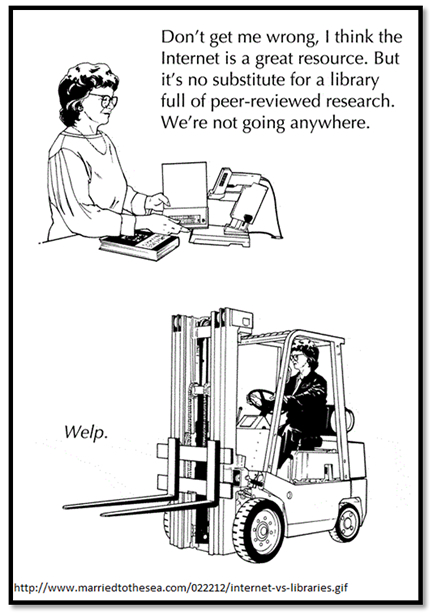So You Think You Want to Be a Librarian?
 Historically, libraries have been the gatekeepers of information so we haven’t been too concerned with justifying our value to the public.
Historically, libraries have been the gatekeepers of information so we haven’t been too concerned with justifying our value to the public.
“We have the information. If you want the information, come get it.”
Well, we had it, anyway.
In his article “So You Think You Want to Be a Librarian?” Brian Kenney addresses the issue of change, both in the demeanor of libraries towards the public and the use of technology by libraries. He asserts that in order to thrive, libraries must shift their historical position from focusing on library holdings to focusing on their relationship with library users.
We cannot expect users to do the legwork to connect with the library. It’s our job to design the library, both in its physical and virtual states, to be appealing, engaging and easy to use. Libraries must be responsive to the needs of their users and must seek the input of our users to create what Kenney calls “one of the best experiences of the day."
Kenney asks libraries to examine our codes of conduct and questions how “can we expect to survive when our standards for behavior are so divergent from those of the rest of society?” He mentions that libraries are notorious for their list of “No’s,” e.g. drinks, cell phones, food or snacks, etc. Kenney has a point but I do think there is a middle ground more beneficial for all parties. Instead of outright bans, why not seek an engaging compromise that also happens to be enjoyable to the user, e.g., “Please use your phone courteously for fear of waking the Kraken!”? Let’s connect to our customers using a mix of humor and practicality. For example, with Mango Languages, we could tweet “While Dothraki isn't in @mangolanguages (yet), you can learn Pirate (alongside real languages) #gameofthrones” and include a link to Mango? If we see a customer browsing the travel guides, let's be proactive by approaching them and mentioning that they can learn Italian for free with Mango and can even learn it “on the go” with the Mango app. In this age of ever-expanding information sources and the public’s overwhelmed, if not diminished, ability to manage this information, it’s up to libraries to connect with the public in a way that matters, i.e. tell our “story” to customers in a way that’s engaging and in which they can easily envision using the library to add to and enhance their life.
The arrival of “technology,” which Kenney defines in the broadest sense of the term, and its spread throughout society has leveled the playing field by making much more information much more accessible without much effort. This has shifted the tone of the conversation on the part of libraries from indifferent, as illustrated at the beginning of this post, to desperate, similar to a younger sibling begging for attention from their older sibling. But I don’t believe it has to be this way. I think we can build a space full of passionate, knowledgeable evangelists to show the public, library users and non-users alike, how they can use their library to change their lives.
A quote often attributed to futurist Alvin Toffler from his book Future Shock, but which is actually a paraphrase of his words and the words of psychologist Herbert Gerjuoy, is “The illiterate of the 21st century will not be those who cannot read and write but those who cannot learn, unlearn and relearn.” This maxim has a special application to all who work in a library. Now more than ever, we libraries must be a proactive and flexible bunch, reaching out to the customer instead of waiting for them to initiate the conversation, being aware of trends (be they social, technological or otherwise) and always looking to see whether and how a trend can be leveraged to provide a better user experience.
- Log in to post comments

Comments
Welcome to MLS, Tim. I know you will do your part to keep us up on trends and how we can use them to better serve our customers. I love your cartoon.
As I read your post, Tim, I'm reminded that while I'm not a librarian, nor do I think you want me to be (ha!), I believe very strongly in the shift to relationship building as the core of library services. The approach suggested reminds me of how I tell my friends and family about all the library has to offer them. This is easily extended to our customers (in my case, volunteers) if we focus on their needs. This year in working with volunteers we have been actively looking for ways to connect with volunteers as people and help them develop personally and professionally, which in turn will affect how the volunteers help library customers. Thanks for being here and sharing an intriguing perspective.
To me, this article is refreshing and energizing.
I love working at a place where everyone is so dedicated to helping people! I think we are keeping up with the trends and readily adjusting to the all of the ever-changing technologies. I love the article!
This article made me so proud to work for the library system! I think we are doing a great job of focusing on the needs of our customers and tailoring our services to meet them where they are. I particularly liked the last sentence or two: "...librarians enable learning, which as any librarian will tell you is common practice. It’s so common, in fact, that we never seemed to notice. Now it’s the story we need to tell."
I agree, we could be doing so much better at being proactive and flexible!
We are in the business of customer service just as much as the business of information science.
Great article Tim! I look forward to reading more.